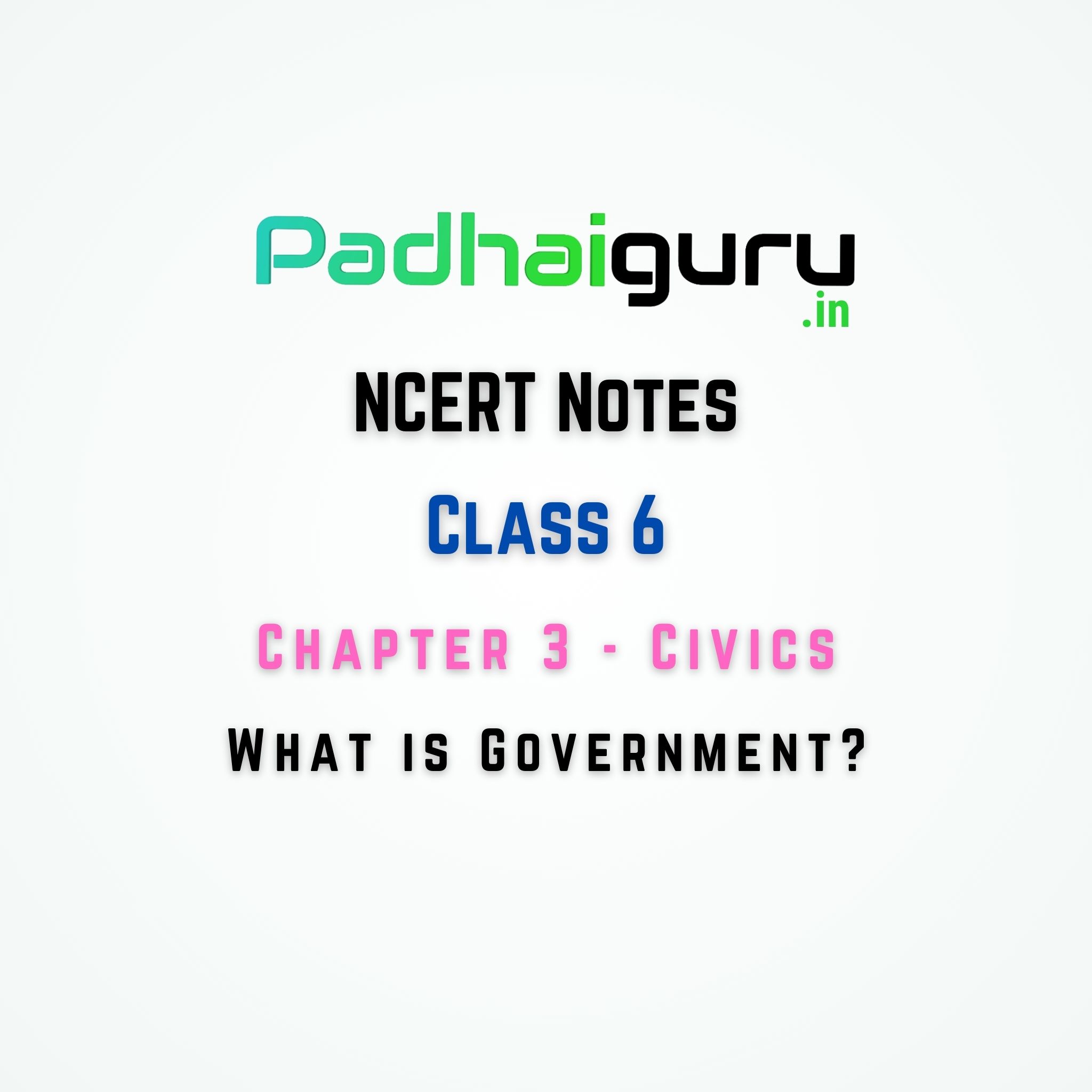03. What is government ? class 6 NCERT Notes for Social Science Chapter 3 – Civics download pdf

Discover the comprehensive Social Science – Civics NCERT notes for Chapter 3, “What is Government class 6” thoughtfully crafted by padhaiguru.in .
Class 6 – Social and Political Life (POLITY)
Chapter 3: What is Government?
Introduction to Government
A government refers to the system or group of individuals that govern an organized community, often a state. It is comprised of three main branches: legislature, executive, and judiciary.
Role and Functions of Government
- Constitution and Philosophy: Each government has its own constitution, outlining governing principles and philosophy.
- Protecting Boundaries: Governments safeguard a nation’s borders and maintain peaceful relations with other countries.
- Citizen Welfare: Ensuring citizens’ access to food, healthcare, and well-being is a crucial responsibility.
- Disaster Response: During natural disasters, governments organize aid and assistance for affected individuals.
- Legal System: Courts, integral to the government, handle disputes and crimes.
Levels of Government
- Local Level: Government operates at the local level, in villages, towns, and localities.
- State Level: The state-level government governs entire states, like Haryana or Assam.
- National Level: Government at the national level covers the entire country.
Laws and Governance
- Laws are created by the government and are binding on all citizens.
- Government has the power to make and enforce decisions through laws.
- Examples include laws requiring driving licenses; violations lead to penalties or imprisonment.
Government Types
- Democracy: Power is granted by the people through elections. Elected representatives form the government. Transparency and accountability are key in democracy.
- Monarchy: A monarch (king/queen) holds decision-making power without being required to explain or defend decisions.
Democratic Governance
- Democracy in India: India is a representative democracy, reflecting the power of the people in electing leaders.
- People’s Rule: Democracy entails people’s participation in rule-making, often through elected representatives.
- Universal Adult Franchise: Inclusive voting rights for all adults is a hallmark of democracy.
- Gandhiji’s Advocacy: Gandhiji championed universal adult franchise for equal participation regardless of wealth or education.
Women’s Suffrage Movement
- Empowerment Struggle: Women’s suffrage movement aimed to secure women’s right to vote.
- World War Influence: During WWI, women took on roles previously considered men’s work, challenging gender stereotypes.
- Suffragettes’ Actions: Women chained themselves to public railings to demand voting rights.
- Struggle and Imprisonment: Suffragettes endured imprisonment and hunger strikes to advance their cause.
- Global Impact: American women gained voting rights in 1920, while UK women achieved equal terms in 1928.
Keywords and Definitions
- Constitution: A set of fundamental principles outlining the structure and functions of a government.
- Transparency: Openness and accountability in government actions and decisions.
- Accountability: The responsibility to answer for decisions and actions.
FAQs (Frequently Asked Questions) – for What is Government class 6 chapter 3
1. What is the main purpose of a government?
The primary role of a government is to govern an organized community, enforce laws, and ensure the well-being of its citizens.
2. What are the three branches of government?
The three main branches of government are the legislature, responsible for making laws; the executive, in charge of implementing laws; and the judiciary, which interprets laws and ensures justice.
3. How does a democracy differ from a monarchy?
In a democracy, power comes from the people through elections, and the government is accountable to the people. In a monarchy, a monarch holds decision-making power without the same level of accountability.
4. What is universal adult franchise?
Universal adult franchise means that all adults in a country have the right to vote, regardless of factors like wealth or education.
5. How did the women’s suffrage movement impact society?
The women’s suffrage movement challenged gender stereotypes, empowered women, and led to equal voting rights for women, contributing to greater gender equality.
6. What is the significance of local, state, and national-level governments?
Different levels of government cater to specific geographic areas, ensuring effective governance from local communities to entire countries.
7. How did Gandhi advocate for universal adult franchise?
Gandhi believed that voting rights should be extended to all adults, irrespective of their wealth or literacy, to ensure fairness and equality in governance.
8. What led to the evolution of representative democracies?
Representative democracies emerged to enable efficient governance by allowing elected representatives to make decisions on behalf of the entire population.
9. How did suffragettes protest for their rights?
Suffragettes protested by chaining themselves to public railings, going on hunger strikes, and demanding equal voting rights for women.
10. What is the significance of transparency in a democracy?
Transparency ensures that government actions and decisions are open to scrutiny, promoting accountability and trust between the government and the people.
This was the end of ncert notes on What is government class 6 chapter 3 social science.
For more information, refer to NCERT SOLUTIONS, NCERT NOTES, and NCERT BOOKS
